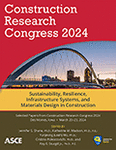Modeling and Predicting Deterioration of Concrete Bridge Elements Using Machine Learning
Publication: Construction Research Congress 2024
ABSTRACT
Prediction of bridge elements’ deterioration is an essential task in maintenance planning to preserve bridges in a functioning and safe state. Several stochastic and data-driven approaches are used in the literature to estimate deterioration of bridge elements. However, these approaches rely on expert judgments of deterioration parameters or subjective selection of deterioration factors. The objective of this paper is to predict health index (HI) of concrete bridge elements using machine learning methods based on National Bridge Inventory (NBI) and the National Bridge Elements (NBE) databases. To this end, entropy-based mutual information analysis is applied to evaluate the influence of different deterioration factors, such as daily traffic, location, and age on bridge elements deterioration. Moreover, several machine learning models are developed to identify the best method to predict bridge elements’ HI. Based on predictive performance metrics results, random forest method had the best performance in terms of mean absolute error, root mean square error, mean absolute percentage error, and coefficient of determination metrics for all the elements. The primary contributions that this research adds to the body of knowledge are (1) application of entropy-based mutual information to evaluate linear and nonlinear impact of different factors on bridge elements deterioration, and (2) development of new machine learning models to predict deterioration of bridges with various characteristics including age, daily traffic, and location. The models developed and presented herein are expected to support decision makers in identifying optimal time of interventions to minimize maintenance costs while maximizing bridge performance.
Get full access to this article
View all available purchase options and get full access to this chapter.
REFERENCES
Alonso Medina, P., León González, F. J., and Todisco, L. (2022). “Data-driven prediction of long-term deterioration of RC bridges.” Construction and Building Materials, 317.
Althaqafi, E., and Chou, E. (2022). “Developing Bridge Deterioration Models Using an Artificial Neural Network.” Infrastructures, 7(8).
Chase, S. B., Adu-Gyamfi, Y., Aktan, A. E., and Minaie, E. (2016). “Synthesis of National and International Methodologies Used for Bridge Health Indices.” Federal Highway Administration,.
Farahani, M. A., Vahid, A., and Goodwell, A. E. (2022). “Evaluating Ecohydrological Model Sensitivity to Input Variability with an Information-Theory-Based Approach.” Entropy, 24(7), 1–22.
FHWA. (2018). FHWA Bridge Preservation Guide Maintaining a Resilient Infrastructure to Preserve Mobility Quality Assurance Statement.
Ghafoori, M., and Abdallah, M. (2022a). “Simulation-Based Optimization Model to Minimize Equivalent Annual Cost of Existing Buildings.” Journal of Construction Engineering and Management, 148(2).
Ghafoori, M., and Abdallah, M. (2022b). “Building Optimization Model for Minimizing Operation and Maintenance Costs.” Construction Research Congress 2022: Project Management and Delivery, Controls, and Design and Materials - Selected Papers from Construction Research Congress 2022.
Ghafoori, M., and Abdallah, M. (2022c). “Estimating Electricity Consumption of Buildings Using Information Theory and Machine Learning Methods.” Construction Research Congress 2022: Project Management and Delivery, Controls, and Design and Materials - Selected Papers from Construction Research Congress 2022.
Ghafoori, M., and Abdallah, M. (2022d). “Innovative Optimization Model for Planning Upgrade and Maintenance Interventions for Buildings.” Journal of Performance of Constructed Facilities, American Society of Civil Engineers, 36(6), 04022051.
Liu, K., and El-Gohary, N. (2020). “Fusing Data Extracted from Bridge Inspection Reports for Enhanced Data-Driven Bridge Deterioration Prediction: A Hybrid Data Fusion Method.” Journal of Computing in Civil Engineering, 34(6).
Liu, K., and El-Gohary, N. (2022). “Deep Learning–Based Analytics of Multisource Heterogeneous Bridge Data for Enhanced Data-Driven Bridge Deterioration Prediction.” Journal of Computing in Civil Engineering, 36(5), 1–14.
Ross, B. C. (2014). “Mutual information between discrete and continuous data sets.” PLoS ONE, 9(2).
Srikanth, I., and Arockiasamy, M. (2020a). “Deterioration models for prediction of remaining useful life of timber and concrete bridges: A review.” Journal of Traffic and Transportation Engineering (English Edition).
Srikanth, I., and Arockiasamy, M. (2020b). “Deterioration models for prediction of remaining useful life of timber and concrete bridges: A review.” Journal of Traffic and Transportation Engineering (English Edition), Elsevier Ltd, 7(2), 152–173.
Toasa Caiza, P. D., Ummenhofer, T., Correia, J. A. F. O., and De Jesus, A. (2020). “Applying the Weibull and Stüssi Methods that Derive Reliable Wöhler Curves to Historical German Bridges.” Practice Periodical on Structural Design and Construction, 25(4).
Information & Authors
Information
Published In
History
Published online: Mar 18, 2024
Authors
Metrics & Citations
Metrics
Citations
Download citation
If you have the appropriate software installed, you can download article citation data to the citation manager of your choice. Simply select your manager software from the list below and click Download.
